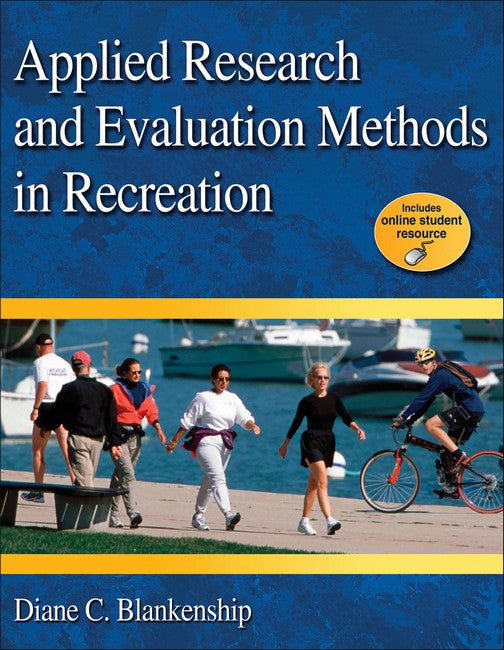Diane C. Blankenship, EdD, is an associate professor at Frostburg State University in Frostburg, Maryland, where she teaches courses in research methods in the recreation and parks management program. She also serves on the program's graduate thesis and project committee. Blankenship has extensive and varied experience, having worked as a professional Boy Scout and a recreation therapist; in residential camps, aquatic facilities, recreation centers, and outdoor recreation facilities; and for the Department of the Army in Germany. Blankenship has used her skills in recreation and leisure research methods to assist local and state organizations in the evaluation of their programs and facilities and in strategic planning. She is a member of the Maryland Recreation and Parks Association (MRPA) and has served numerous times on the conference committee and as the coordinator of data analysis for all conference evaluations. In addition, she serves as a site visitor for the Commission for Accreditation of Park and Recreation Agencies (CAPRA) and as a recreation commissioner for the City of Frostburg. In her free time, Blankenship enjoys walking rail-trails, knitting, and traveling with her daughter to Native American reservations. She and her husband, Calvin, and their daughter reside in Frostburg.
Request Academic Copy
Please copy the ISBN for submitting review copy form
Description
Chapter 1 Investigative Overview Foundational Knowledge for Researchers Benefits of Conducting Research and Evaluation CAPRA Issues Related to Research and Evaluation Benefits of Research and Evaluation for the Professional Conclusion Learning Aids Chapter 2 The Research and Evaluation Process Elements of the Scientific Method of Inquiry Elements of the Evaluation Research Process Comparing the Scientific Method of Inquiry Research and Evaluation Research Steps of the Research Process Quantitative and Qualitative Study Designs Conclusion Learning Aids Chapter 3 The Research Problem Defining the Research Problem Purpose of the Study Research Questions Quantitative Research Designs Qualitative Research Designs Action Research Conclusion Learning Aids Chapter 4 Review of Literature What Is a Review of Literature? Why Conduct a Review of Literature? How to Find Literature Synthesizing the Literature Conclusion Learning Aids Chapter 5 Variables and Hypotheses in Study Designs Relationships Variables Hypotheses Measurement Scales Conclusion Learning Aids Chapter 6 Ethics in Research Protection From Harm Confidentiality Parental Permission Avoiding Deception Using All Data Avoiding Coercion Conclusion Learning Aids Chapter 7 Sampling Defining the Population Sampling Techniques Sampling Issues Conclusion Learning Aids Chapter 8 Instrumentation Selecting a Leader Defining the Population Making an Instrumentation Plan Kinds of Data Conclusion Learning Aids Chapter 9 Data Collection Tools Data Collection Tools Instrument Selection Instrument Considerations Validity of the Instrument Reliability of the Instrument Conclusion Learning Aids Chapter 10 Internal Validity Review of Validity 10 Threats to Internal Validity Validity in Qualitative Designs Reliability Relationship Between Validity and Reliability Conclusion Learning Aids Chapter 11 Data Analysis Descriptive Statistics Range Standard Deviation Additional Statistical Analysis Qualitative Data Analysis Conclusion Learning Aids Chapter 12 The Research Report Executive Summary Purpose of the Study Background Methods Results Recommendations Conclusion Learning Aids

